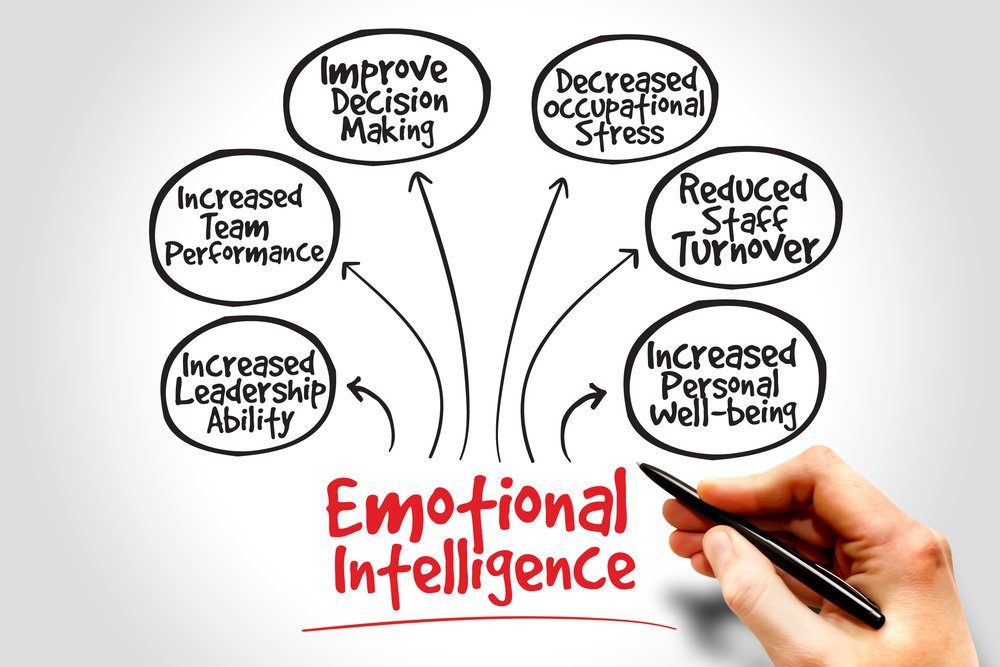In today’s world, where competition in business is only increasing, making a profit is more important than ever before. In order to make a profit, a company needs to close deals with customers. However, successfully closing deals does not always depend on the quality of the product or service the company offers. The ability of salespeople to negotiate and interact with clients on an emotional level plays a big role here. And here you can’t do without knowledge of psychology, in particular knowledge in such an area as emotional intelligence. In this article we will dive into the world of emotional intelligence and its role in sales.
Emotional Intelligence (EQ) is a person’s ability to understand, manage, and express his or her own emotions as well as the emotions of others.
Although the term “emotional intelligence” became widely known in 1995 with the best-selling book “Emotional Intelligence – Why it can mean more than IQ,” research by scientists in this area began long before it became widely known. The author of the book is the American psychologist and popularizer of science Daniel Goleman. He viewed emotional intelligence as the ability to manage one’s own emotions and the emotions of others, which is important for successful adaptation in social environments and the achievement of personal and professional goals.

According to Daniel Goleman’s theory EQ consists of five components, which include the following aspects:
- Self-awareness is the ability to understand one’s emotions, feelings, strengths, weaknesses, preferences, and the importance of their influence on behavior and decision-making.
- Self-regulation is the ability to control and manage one’s emotions and to react appropriately to various situations without becoming overly emotional.
- Motivation is the ability to self-motivate oneself to achieve goals by going through difficulties and failures.
- Empathy is the ability to feel and understand the emotional state of others, taking into account their views and feelings, and to be able to put yourself in their place.
- Social skills are the ability to communicate effectively, establish relationships, resolve conflicts, work as a team, and persuade others.
Since the emergence of the concept of “emotional intelligence,” scientists have conducted numerous studies that have revealed the relationship and influence of a particular level of emotional intelligence on various areas and aspects of human life.

The relationship between emotional intelligence and job performance: research has shown that people with higher levels of emotional intelligence tend to be more effective in management positions and are more likely to succeed in their careers.
There has also been research on the relationship between emotional intelligence and psychological health. Cross-cultural perspectives on emotional intelligence: research has examined cultural differences in emotional intelligence and how cultural factors can influence the development and expression of emotional intelligence.
Business and emotional intelligence occupy a weighty layer of research in the overall configuration, particularly as it relates to the direction of sales. Studies have shown that a high level of emotional intelligence allows the employee to successfully resolve conflicts with customers, convince and guide them in the right direction. By understanding the emotions of the interlocutor, the employee can adapt his or her communication style to the specific customer in order to create an emotional connection and trust.
In addition, emotional intelligence helps to prevent possible conflicts and eliminate customer dissatisfaction by listening and understanding their problems and needs. A salesperson with a high level of emotional intelligence is able to find a common language with the client and adapt to different situations, which is an important skill for successful sales.
In general, emotional intelligence helps the employee in sales to connect with the customer, understand their needs and motives, resolve conflicts, convince and guide the customer in the right direction, which ultimately contributes to the conclusion of successful deals.
Scientists have conducted more than one study proving that high levels of emotional intelligence have a positive effect and allow for more successful transactions.
So, in 2015, the results of a study conducted by scientists from Walden University (USA) were published. According to the researchers, U.S. business leaders spend $15 billion a year on sales training, but about 50% of salespeople still do not reach their annual sales targets.
The purpose of this quantitative correlational study was to examine the relationship between emotional intelligence and performance sales in the United States by experts. Most of the participants in the study were middle-aged men. Half of the respondents were directly involved in sales, the other half in sales management. According to their numbers, all of them fulfilled, on average, 86% of their annual sales plan.
In the study, researchers tested the relationship of sales performance not only with emotional intelligence, but also self-perception, self-expression, decision-making and stress management.
The study showed that emotional intelligence plays an important role in sales. The EQ-i 2.0® measurement revealed a significant correlation between the emotional intelligence branch, decision-making and sales. Therefore, decision-making is also a significant predictor of sales and about 10% of the variance in sales can be explained by decision-making.
Studies of scientists proving the significant influence of emotional intelligence on the effectiveness of sales became a springboard for the creation of techniques, approaches that allow the development of EQ, as well as the use of knowledge for effective sales.
For example, the book “Emotional Intelligence in Sales” by Halyna Shabshai describes ten enneatypes, each of which corresponds to a different type of thinking: critical, variational, imaginative, creative, analytical, logical, panoramic, strategic, abstract and existential thinking.
For each enneatype there is a description of appearance, inherent character traits and characteristic behavioral patterns. Based on the understanding of the natural behavior and thinking patterns of people, it is possible to build effective tactics, to develop behavioral scenarios for an individual approach when working with clients.

Halyna Shabshai – psychologist, Ukrainian and Israeli writer, expert in the field of integrative psychotherapy in her research and practice pays special attention and importance to the emotional intelligence. In her monograph “Integrative Psychotherapy and Proactive Coaching of the Person-Business-Family System in the Modality of the Personal Source Code”, Halyna Shabshai presents the theory of the “Human Source Code” in which emotional intelligence is one of the three components. The notion of “Human Source Code” according to the theory presented is a person’s potential, given at birth, on which a person relies to move towards his or her dreams and goals. Human potential in this theory is seen as a dynamic category that a person can improve, including the development of emotional intelligence.
Emotional intelligence varies from person to person. Companies can hire people with the necessary level of EI, but it is always possible. That’s why today there are many techniques and tests that allow you to determine the level of EQ and at the same time techniques that allow you to develop it.
A person with high emotional intelligence usually has the following characteristics:
- The ability to recognize emotions in himself and others. He can easily recognize how he himself feels and how other people feel in certain situations.
- The ability to manage his emotions. He can control his feelings and emotions to prevent them from negatively influencing behavior and decisions.
- The ability to understand and empathize with other people. He can understand other people’s emotions and feelings and be ready to help and support them.
- Ability to establish contact with people. He can easily find common language and establish contact with different people.
- Ability to resolve conflicts. He can resolve conflicts effectively using his emotional intelligence and ability to cooperate.
A person with low emotional intelligence may often have difficulty managing his or her emotions and reacting inappropriately to situations, which can lead to conflict and irritability. He or she may also have difficulty making decisions and tend to keep things under control in order to avoid feelings of helplessness. Such characteristics often manifest themselves in negative emotions, such as anger, which can affect relationships with others. However, it is important to remember that emotional intelligence can be developed, and everyone can learn to manage their emotions and resolve conflicts more effectively.
Undoubtedly, the development of EQ, as one factor, allows not only to become more successful in transactions, but also to solve problems or difficulties in many other areas of life.











